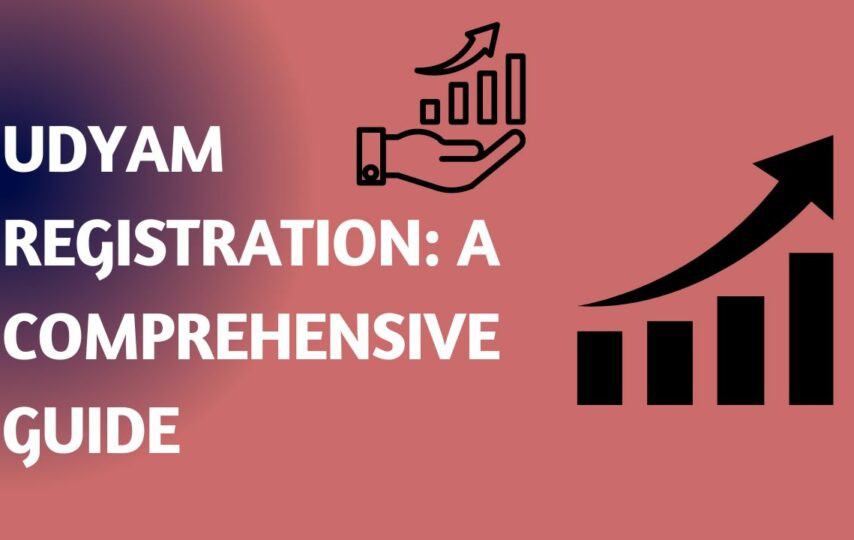As a small business owner, you are no stranger to the challenges of running a business. From managing finances to creating a strong brand presence, there are numerous tasks that demand your attention. However, there’s one aspect of your business that you simply can’t afford to ignore – Udyam registration. In this article, we’ll delve into what Udyam registration is, why it’s important, and who is eligible for it.
Definition of Udyam Registration
Udyam registration is a process of obtaining a unique identification number for Micro, Small and Medium Enterprises (MSMEs) in India. It was introduced by the Ministry of Micro, Small and Medium Enterprises to provide a single-window system for registration and classification of MSMEs. This system replaces the erstwhile Udyog Aadhaar Memorandum (UAM) and requires businesses to register themselves on the Udyam Registration Portal.
Importance of Udyam Registration
Udyam registration is crucial for the growth and success of MSMEs in India. Firstly, it provides a unique identity to businesses, which is necessary for availing various benefits and schemes offered by the government. These benefits include access to credit at lower interest rates, tax exemptions, and subsidies for participating in trade fairs and exhibitions.
Secondly, Udyam registration enhances the credibility of a business, as it is a testament to the fact that the business has been recognized by the government. This, in turn, helps in building trust with customers, suppliers, and other stakeholders.
Lastly, Udyam registration is mandatory for businesses that wish to participate in government tenders. Without this registration, businesses are not eligible to bid for government projects, which can be a significant source of revenue for MSMEs.
Eligibility Criteria for Udyam Registration
To be eligible for Udyam registration, a business must meet the following criteria:
- It must be a business entity registered as a proprietorship, partnership, LLP or private limited company
- It must have a valid PAN and GSTIN
- Its turnover must not exceed Rs. 25 crore
- It must not be engaged in the production or manufacture of restricted items as per the Industrial Development and Regulation Act, 1951.
Step-by-Step Guide to Udyam Registration
If you’re a small business owner in India, then you’re probably aware of Udyam Registration, a government initiative aimed at supporting and promoting small and medium enterprises. Udyam Registration is a crucial step for businesses looking to gain benefits and opportunities provided by the government. In this article, we’ll guide you through the process of registering for Udyam Registration.
Understanding the Udyam Registration Process
Before we delve into the registration process, it’s essential to understand what Udyam Registration is. Udyam Registration is an online registration process introduced by the Ministry of Micro, Small, and Medium Enterprises (MSME). It replaced the previous registration process known as Udyog Aadhaar. Udyam Registration is entirely paperless, and it can be done online through the Udyam Registration Portal.
Documents Required for Udyam Registration
To complete the Udyam Registration process, you need to have specific documents ready. These include your Aadhaar card, PAN card, and bank account details. Additionally, you’ll need to provide details about your business, such as its name, location, and type of business activity. You’ll also have to specify the number of employees in your company and your total investment in plant and machinery.
How to Register for Udyam Registration
The Udyam Registration process is quite simple and can be completed in a few easy steps. First, you need to visit the Udyam Registration Portal and register with your Aadhaar number. Once you’ve registered, you’ll need to provide the required details and upload the necessary documents. The portal will then verify your details, and upon successful verification, you’ll receive a Udyam Registration certificate.
Common Mistakes to Avoid during Udyam Registration
While registering for Udyam Registration, it’s important to avoid some common mistakes. One of the most common errors is providing incorrect details, which can lead to the rejection of your application. Another mistake is not providing all the necessary documents or providing incomplete documents. To avoid these mistakes, make sure you double-check all the details and documents before submitting your application.
Benefits of Udyam Registration
Udyam Registration is a registration process introduced by the Ministry of Micro, Small and Medium Enterprises (MSME) to provide various benefits to small and medium enterprises in India. The benefits of Udyam Registration are numerous and can be categorized into financial benefits, legal benefits, and other benefits. In this article, we will discuss each of these benefits in detail.
Financial Benefits of Udyam Registration
Easy access to credit: Udyam Registration provides easy access to credit facilities from banks and other financial institutions. Udyam Registered enterprises are eligible for various government schemes, including the Credit Guarantee Fund Trust for Micro and Small Enterprises (CGTMSE), which provides collateral-free loans up to Rs. 2 crores.
Lower interest rates: Udyam Registered enterprises are eligible for lower interest rates on loans as compared to non-registered enterprises. This is because Udyam Registration provides a sense of authenticity and credibility to the enterprise, making it a more reliable borrower in the eyes of the lender.
Eligibility for subsidies: Udyam Registered enterprises are eligible for various subsidies and incentives provided by the government. These subsidies can be in the form of tax benefits, interest subsidies, or subsidies on the cost of machinery.
Legal Benefits of Udyam Registration
Protection against delayed payments: Udyam Registration provides protection against delayed payments from buyers. If a buyer does not make the payment within the agreed timeframe, the Udyam Registered enterprise can file a complaint and seek redressal under the Micro, Small and Medium Enterprises Development (MSMED) Act, 2006.
Protection against collateral: Udyam Registration provides protection against collateral for loans taken by the enterprise. In case of default on loan repayment, the lender cannot seize any asset of the Udyam Registered enterprise without prior permission from the MSME ministry.
Exemption from certain taxes: Udyam Registered enterprises are eligible for various tax exemptions and concessions provided by the government. These exemptions can be in the form of excise duty exemption, exemption from certain direct taxes, and exemption from payment of stamp duty on loans and mortgages.
Other Benefits of Udyam Registration
Access to government schemes and programs: Udyam Registration provides access to various government schemes and programs, including procurement schemes, marketing assistance schemes, and technology upgradation schemes.
Enhanced marketability: Udyam Registration provides a sense of authenticity and credibility to the enterprise, making it more marketable and attractive to customers and suppliers.
Easy to obtain licenses and permits: Udyam Registration makes it easier for enterprises to obtain various licenses and permits required to operate a business, including pollution control certificate, NOC from fire department, and many more.
Difference between Udyam Registration and MSME Registration
MSME stands for Micro, Small and Medium Enterprises. MSME Registration is a government registration process for businesses to avail of various benefits and schemes provided by the government for the growth and development of small and medium enterprises. MSMEs are classified into two categories: manufacturing enterprises and service enterprises.
Key Differences between Udyam Registration and MSME Registration:
- Eligibility Criteria: Udyam registration is applicable only to micro, small, and medium-sized enterprises, while MSME registration is applicable to both manufacturing and service enterprises.
- Investment Limits: The investment limit for Udyam registration is higher than that of MSME registration. For example, a micro-enterprise under Udyam can have an investment up to Rs. 1 crore, whereas under MSME, the limit is only Rs. 25 lakh.
- Turnover Limits: The turnover limit for Udyam registration is also higher than that of MSME registration. For instance, a micro-enterprise can have a turnover of up to Rs. 5 crore under Udyam, whereas under MSME, the limit is only Rs. 5 lakh.
- Validity Period: Udyam registration certificate is valid for a period of 3 years from the date of registration, while MSME registration certificate is valid for a lifetime.
- Registration Process: The registration process for Udyam registration is online, and the registration fee is nominal. On the other hand, the MSME registration process can be done online or offline, and the registration fee is higher than that of Udyam registration.
- Government Benefits: Both Udyam and MSME registrations offer various government benefits, such as subsidies, tax exemptions, and credit guarantees. However, the benefits offered by Udyam registration are more comprehensive and extensive compared to those offered by MSME registration.
Frequently Asked Questions about Udyam Registration
Starting a new business can be an exciting, yet overwhelming experience. One of the critical steps is to register your business with the appropriate government agency. For small businesses in India, Udyam Registration is a necessary process to avail benefits and recognition as an MSME. As with any new process, it’s natural to have some questions. In this section, we’ll address some frequently asked questions about Udyam Registration.
What is the validity of Udyam Registration?
Udyam Registration is a one-time registration process for MSMEs. Unlike other registrations like GST, which require periodic renewals, Udyam Registration has no expiry date. Once you’ve completed the registration process and obtained your Udyam Registration certificate, it remains valid for the lifetime of your business. However, it’s essential to update your details if there are any significant changes in your business structure or ownership.
Is Aadhaar Card mandatory for Udyam Registration?
Yes, Aadhaar Card is mandatory for Udyam Registration. One of the key features of Udyam Registration is that it simplifies the registration process and eliminates the need for multiple documents. To facilitate this, the registration process requires the submission of an Aadhaar Card number of the business owner or authorized signatory. It’s important to note that the Aadhaar Card should be linked with the business owner’s PAN card to avoid any discrepancies.
Can a business with multiple branches apply for Udyam Registration?
Yes, a business with multiple branches can apply for Udyam Registration. The registration process is done online, and businesses can register their multiple branches using a single registration number. It’s important to note that each branch must have a unique GSTIN, and the combined turnover of all branches should not exceed the threshold limit for MSME classification.
Challenges and Solutions for Udyam Registration
Udyam Registration is a mandatory process that requires all Micro, Small, and Medium Enterprises (MSMEs) to register themselves with the Ministry of Micro, Small and Medium Enterprises (MSME). The registration process has been simplified and made online to encourage the growth of the MSME sector. However, like any other registration process, Udyam Registration also comes with its own set of challenges. In this article, we will discuss the common challenges faced during Udyam Registration and possible solutions to overcome them.
Common Challenges faced during Udyam Registration
Technical Issues:
One of the most common challenges faced by MSMEs during Udyam Registration is technical issues such as slow internet speed, server downtime, and other technical glitches. This can lead to delays in the registration process and cause frustration among business owners.
Lack of Awareness:
Another challenge faced by MSMEs during Udyam Registration is the lack of awareness about the process and requirements. Many business owners are not familiar with the registration process, the necessary documents, and the eligibility criteria. This can lead to mistakes in the application and rejection of the application.
Document Verification:
Document verification is a crucial step in the Udyam Registration process. Many MSMEs face challenges in getting their documents verified by the authorities. This can cause a delay in the process and may result in the rejection of the application.
Possible Solutions for Udyam Registration Challenges
Technical Support:
To overcome technical issues, MSMEs can seek technical support from the Udyam Registration portal or from professional service providers. They can also try registering during off-peak hours or using a different device or internet connection to avoid technical issues.
Awareness Campaigns:
The government can conduct awareness campaigns to educate business owners about the Udyam Registration process, its benefits, and the necessary documents. This can help reduce errors in the application and improve the success rate of the registration process.
Professional Services:
MSMEs can also seek the help of professional service providers who can guide them through the registration process, verify their documents, and ensure a smooth registration process. These service providers can also provide support in case of any technical issues or document verification challenges.
Impact of Udyam Registration on Indian Economy
The Micro, Small and Medium Enterprises (MSME) sector has been an integral part of the Indian economy, contributing significantly to employment and economic growth. The government’s focus on the growth and development of this sector has led to the introduction of various schemes and initiatives, one of which is the Udyam Registration.
I. Role of Udyam Registration in boosting the Indian Economy
The Udyam Registration, which was launched by the Ministry of Micro, Small and Medium Enterprises (MSME) in July 2020, is a step towards the promotion, development and growth of the MSME sector. The Udyam Registration replaces the earlier system of registration known as the MSME registration, which was based on the investment made in plant and machinery.
One of the key benefits of the Udyam Registration is the access to various government schemes and benefits that were earlier available only to those registered under the MSME registration. The Udyam Registration ensures that businesses receive timely and adequate credit, necessary technological upgradation, marketing assistance and other forms of support from the government.
Udyam registration also helps in formalization of the MSME sector, thereby reducing the number of unregistered and unorganized MSMEs in the country. Formalization of the MSME sector leads to increased transparency, better access to finance and better market linkages. Udyam registration also promotes entrepreneurship and helps in creating a conducive business climate in the country.
Second. Case Study of Businesses Benefiting from Udyam Registration
Various businesses across the country have already benefited from Udyam Registration. One such example is that of a small scale enterprise, which was earlier registered under MSME registration with an investment of Rs. 10 lakhs in plant and machinery. After the launch of Udyam Registration, the same business was re-registered under Udyam with a turnover of Rs. 1 crore, which helped them access various government schemes and benefits.
Another example is of a manufacturer of handicrafts, who had earlier registered under MSME registration, but with the launch of Udyam registration, they were able to re-register under Udyam, giving them greater visibility and access to global markets. done. As a result, his business grew tremendously, creating more employment opportunities.
conclusion:
Udyam registration is a powerful tool that can help businesses in India achieve greater success and stability. It is important for entrepreneurs to understand the benefits of Udyam Registration, difference between Udyam Registration and MSME Registration and the potential challenges and solutions while applying for Udyam Registration.








